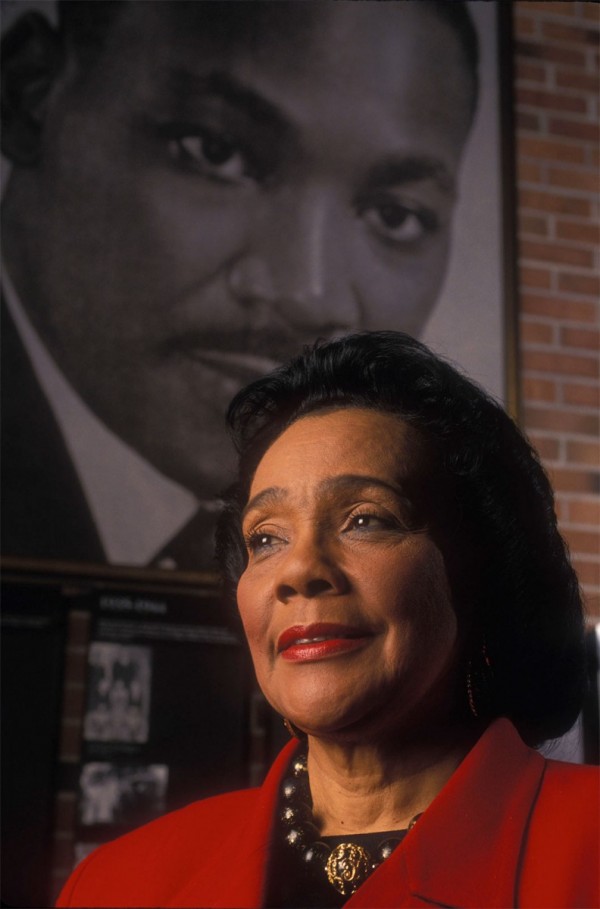 Coretta Scott King’s address in San Diego ultimately influenced President Ronald Reagan’s decision to sign the law creating the Martin Luther King, Jr. Holiday.
Coretta Scott King’s address in San Diego ultimately influenced President Ronald Reagan’s decision to sign the law creating the Martin Luther King, Jr. Holiday.
The California Commission to establish the Martin Luther King, Jr. Day as a federal holiday took place following initial meetings at San Diego Continuing Education’s (SDCE’s) historic Educational Cultural Complex (ECC) in southeastern San Diego.
Martin Luther King, Jr. led the Civil Rights Movement since the mid-1950s, using the power of words and acts of nonviolence such as protests, grassroots organizing, and civil disobedience to achieve equal advances for African Americans in the United States.
Mrs. King’s activism complemented and influenced her husband’s political work, and continued long after his assassination, in 1968. Following the tragedy, the fight for a national holiday in her husband’s name was an uphill battle.
“Mrs. King had to keep her husband's legacy alive with a national holiday,” said Michel Anderson, philanthropist and San Diego Business owner.
Dr. Robert Matthews, civil rights activist and longtime educator alongside Anderson invited Mrs. King and the California Commission to ECC in 1983. SDCE has provided free higher education and workforce training to adults in San Diego since 1914. Students have historically come from disadvantaged backgrounds and often from rural areas and inner cities.
“America is better, and San Diego is a better place because Coretta Scott King came here,” said Anderson. Mrs. King stood for global peace and social justice until her passing, at age 78.
“It was a very different America back then,” said Anderson. “At the time of the assassination America was not ready to make MLK Day a federal holiday.” For many in favor of Dr. King’s non-violent leadership, it made sense to celebrate him. But for others, the suggestion that King deserved a holiday was incomprehensible.
“San Diego does not have a good history of race relations,” said Dr. Matthews. “Regardless of being black or white we must go beyond the horizon. True progress is not going to happen until we have real sisterhood and brotherhood.”
“Not too long ago, there were hotels people of color couldn’t go to. There were picket lines and marches to make San Diego what it is today,” said Anderson.
“San Diego would rather forget that,” said Dr. Matthews.
Anderson and Dr. Matthews recall the day of the California Commission in San Diego at ECC in southeastern San Diego. At the time, Matthews was serving as an administrator at ECC.
“Coretta Scott King was on this campus in 1983,” said Matthews, who today continues a relationship with San Diego Continuing Education (SDCE) through support on an advisory committee of the SDCE Foundation, which is working to preserve this historic symbolism and history of ECC.
“We invited Coretta Scott King to speak at ECC, and she came to rally the nation to celebrate the first MLK Day and Dr. Bob Matthews provided the venue,” said Anderson.
“The Educational Cultural Complex was packed. It was standing room only,” said Anderson. “It was not just southeastern San Diego," he said. "The mayor, the chief of police and all of San Diego's community leaders came here to see Coretta."
In 1983, President Ronald Reagan signed into law the King Holiday bill which made Dr. King’s birthday a federal holiday. The holiday was observed for the first time on January 20, 1986. Today, communities across the nation honor and celebrate the observance.
The dream of Mr. and Mrs. King continues to be remembered in San Diego with the annual Martin Luther King Jr. Parade, the largest celebration of its kind in the United States.
Dr. Matthews came to SDCE as an administrator in the 70s and became involved in the parade, organized by the Alpha Phi Alpha Fraternity since its establishment in San Diego in 1980. Matthews and Dr. King are members of Alpha Phi Alpha.
Students and faculty in SDCE’s welding department design a float each year to echo Dr. King's dream for liberty and freedom. The 2018 design, a steel cut bust of Dr. King has been inaugurated into the city's Broadway Heights neighborhood promenade. Past float entries will be memorialized around the Educational Cultural Complex on Oceanview Blvd. when funding is secured to help display the projects.
“Mrs. King told me I don’t believe in parades,” said Anderson. “I believe in marches. We honor my husband with a march and laws of equality.”
ECC has been a symbol of community and African American activism since its beginnings in 1972. In addition to establishing the King holiday, many other significant events have ties to ECC, including performances by human right champions, Stevie Wonder, and Maya Angelou.
SDCE’s Historic Preservation Committee is working with the city of San Diego and state officials to have ECC named as a Civil Rights Landmark Designation.
“ECC has been stellar in the Civil Rights movement in the city of San Diego. It has a positive impact and should be acknowledged,” said Dr. Matthews.
“ECC was the only place in San Diego where Coretta delivered her address to establish MLK day,” said Dr. Anderson. “ECC should be a Civil Rights landmark.”
To support the historic preservation of the Educational Cultural Complex, SDCE's Foundation is hosting the Coretta Scott King Inaugural Benefit: A Gospel Brunch at 11:30am on Saturday, March 7, 2020 in University Heights. Contact Dr. Laurie Coskey lcoskey@sdccd.edu for sponsorship opportunities or ticket information.
619-319-0209
alluragaris@gmail.com